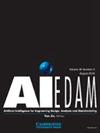Multidisciplinary concurrent optimization framework for multi-phase building design process
IF 2.3
3区 工程技术
Q3 COMPUTER SCIENCE, ARTIFICIAL INTELLIGENCE
Ai Edam-Artificial Intelligence for Engineering Design Analysis and Manufacturing
Pub Date : 2023-01-13
DOI:10.1017/S0890060422000191
引用次数: 1
Abstract
Abstract Modern day building design projects require multidisciplinary expertise from architects and engineers across various phases of the design (conceptual, preliminary, and detailed) and construction processes. The Architecture Engineering and Construction (AEC) community has recently shifted gears toward leveraging design optimization techniques to make well-informed decisions in the design of buildings. However, most of the building design optimization efforts are either multidisciplinary optimization confined to just a specific design phase (conceptual/preliminary/detailed) or single disciplinary optimization (structural/thermal/daylighting/energy) spanning across multiple phases. Complexity in changing the optimization setup as the design progresses through subsequent phases, interoperability issues between modeling and physics-based analysis tools used at later stages, and the lack of an appropriate level of design detail to get meaningful results from these sophisticated analysis tools are few challenges that limit multi-phase multidisciplinary design optimization (MDO) in the AEC field. This paper proposes a computational building design platform leveraging concurrent engineering techniques such as interactive problem structuring, simulation-based optimization using meta models for energy and daylighting (machine learning based) and tradespace visualization. The proposed multi-phase concurrent MDO framework is demonstrated by using it to design and optimize a sample office building for energy and daylighting objectives across multiple phases. Furthermore, limitations of the proposed framework and future avenues of research are listed.多阶段建筑设计过程的多学科并行优化框架
现代建筑设计项目需要建筑师和工程师在设计(概念、初步和详细)和施工过程的各个阶段的多学科专业知识。建筑工程与施工(AEC)社区最近转向利用设计优化技术,在建筑设计中做出明智的决策。然而,大多数建筑设计优化工作要么是局限于特定设计阶段(概念/初步/详细)的多学科优化,要么是跨越多个阶段的单一学科优化(结构/热/采光/能源)。随着设计进入后续阶段,优化设置的改变会变得复杂,后期使用的建模和基于物理的分析工具之间的互操作性问题,以及缺乏适当的设计细节水平以从这些复杂的分析工具中获得有意义的结果,这些都是限制AEC领域多阶段多学科设计优化(MDO)的一些挑战。本文提出了一个计算建筑设计平台,利用并行工程技术,如交互式问题结构,基于模拟的优化,使用能源和采光元模型(基于机器学习)和贸易空间可视化。提出的多阶段并发MDO框架通过使用它来设计和优化一个跨多个阶段的能源和采光目标的示例办公大楼来证明。此外,还列出了所提出的框架和未来研究途径的局限性。
本文章由计算机程序翻译,如有差异,请以英文原文为准。
求助全文
约1分钟内获得全文
求助全文
来源期刊
CiteScore
4.40
自引率
14.30%
发文量
27
审稿时长
>12 weeks
期刊介绍:
The journal publishes original articles about significant AI theory and applications based on the most up-to-date research in all branches and phases of engineering. Suitable topics include: analysis and evaluation; selection; configuration and design; manufacturing and assembly; and concurrent engineering. Specifically, the journal is interested in the use of AI in planning, design, analysis, simulation, qualitative reasoning, spatial reasoning and graphics, manufacturing, assembly, process planning, scheduling, numerical analysis, optimization, distributed systems, multi-agent applications, cooperation, cognitive modeling, learning and creativity. AI EDAM is also interested in original, major applications of state-of-the-art knowledge-based techniques to important engineering problems.

 求助内容:
求助内容: 应助结果提醒方式:
应助结果提醒方式:


